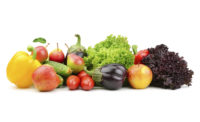SAVE FOOD Promotes Storage, Transportation Solutions to Reduce Produce Spoilage

Editor's Note: The following article was provided by the SAVE FOOD Initiative and edited by Food Safety Magazine staff. SAVE FOOD is a joint initiative of the Food and Agriculture Organization of the United Nations (FAO) and Messe Düsseldorf GmbH against worldwide food loss and waste. For more information, visit SaveFood.org.
Approximately 45% of the fruit and vegetables produced worldwide are not consumed but lost. With the exception of roots and tubers there is no other food segment where the losses are so high on an international scale. Be it kiwis, mangoes or carrots, almost half the crops growing on pastures, plantations and farms never reach the consumer. They go bad, rot or are thrown away because they do not (or no longer) live up to certain retail criteria. Forty-five percent of global production roughly corresponds to 3.7 trillion apples.
Besides bad weather conditions during growing or delayed harvesting, storage and transport are among the biggest risk factors when it comes to fruit and vegetable losses. About 40% of all foodstuffs perish in developing countries immediately after being harvested. On a global scale, the proportion of food becoming unfit for human consumption during transport and distribution is as high as one fifth.
This problem can be solved by using relevant packaging and transport solutions, such as special transportation containers. These containers make it possible to significantly extend the 45-day shelf life by subjecting the foodstuffs to artificial “hibernation.” Sophisticated air-control systems in the containers carefully manage temperature and lower the oxygen content, thereby delaying maturation of the fruit.
Another example of minimizing fruit and vegetable losses comes from XCOM Africa, a business consulting firm that specializes in Africa and is a partner of the SAVE FOOD Initiative. Approximately one third of the mangoes harvested in Kenya go to waste because there is a lack of processing and packaging capacities. At the same time, the international demand for mangoes is high and domestic demand is growing, too. To efficiently tap into this growth potential, XCOM Africa has worked out a dedicated program for local mango processing that enables producers to benefit from higher added value. This program will be implemented shortly with various project partners in Kenya. It contributes to reducing losses since more fruit can be processed with the help of the appropriate processing technology – especially the fruit that is no longer fit for immediate consumption or would not be marketable after a long transport.
Marc Zander, CEO of XCOM Africa, explained, “Even small steps against food losses can produce a major impact on the food supply chains of African states. Products often do not even get to [local] people for a number of reasons. What we need are local, tailor-made solutions such as packaging and transport solutions. SAVE FOOD can provide key momentum and support with its expertise.”
Details on the mango project, and on the overall problem of food loss and waste, will be part of the agenda of the second international SAVE FOOD Congress — co-located with interpack, a major international packaging industry trade fair — in Düsseldorf, Germany from May 7 to 8, 2014.
Looking for a reprint of this article?
From high-res PDFs to custom plaques, order your copy today!





